The 11th Special Exhibition of Atomic Bombing Memoirs “Memories of Urakami”
Seeing the Atomic Bombing in the Summer of my 17th Year
| Tomei Ozaki (Age at the time of the atomic bombing: 17) |
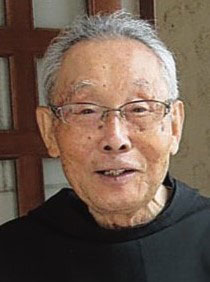 |
|---|
The day of the atomic bombing is the anniversary of my mother’s death
My father passed away from illness when I was in the first grade of elementary school. 10 years after his death, my mother was killed in the atomic bombing. The saddest moment in our life is to be parted from our parents especially when we are very young.
It has been 60 years since I lost my father. My mother died 50 years ago. It was such a long time ago.
I do not remember my father’s face nor the day he was gone. However, I will never forget my mother, her memory and the day she died. It was the day that a single atomic bomb took the lives of 73,000 people.
11:02 a.m. on August 9; this was the time and date of my mother’s death.
My home was located 500 meters from the hypocenter of the atomic bombing, at the place where bombing damages were the worst.
I knew nothing at all about the horrific atomic bomb and for the day of August 9 and the entire month that followed I lived at the focal point of the radiation.
Parting from my mother and leaving for work
That morning, I said, “Mom, I’m going now!” and started off from my house. My mother must not have heard my voice because she didn’t turn around to look at me. So I called out again, “Mom, I’m going now!” and this time my mother, who was cleaning dishes in the kitchen, looked back and gave me a big smile. That was the last time.
That evening, I returned home to find that my mother and our house had been scorched to nothing. In the case of an ordinary fire, some of the burned beams would still be there and some household items would remain, but the blast winds of the atomic bombing had blown everything away and left nothing behind. I could not even collect my mother’s remains. From then on I would never be able to say “Mother” again.
I went to work at the tunnel factory
The reason why I escaped the bombing was because I was working in Sumiyoshi Tunnel Factory which was part of Mitsubishi Arms Plant. I owe my life to that tunnel.
By the time, many parts of Japan were subjected to U.S. air attacks. City after city was burnt down by air raids. When the war escalated, B-29 bombers flying in formation started to appear in Nagasaki. They flew high in the sky above us.
If machines were damaged by the enemy air raids carried out on munitions factories, we would be no longer able to produce weapons. So the authorities decided to dig tunnels in the mountains and transferred the machines. Machines were more important than humans.
We worked in 2 shifts, day and night in the tunnel factory. I survived because I was working the day shift on the day of the atomic bombing. If I was on the night shift, I would have been killed by the bomb.
The moment of the bombing. Blast winds went through the tunnel
I was in charge of making parts for aerial torpedos using a Yon-shaku (*shaku is traditional Japanese units of measurement. 1 shaku is 30.3 cm) lathe.
Suddenly, a huge sound pierced my ears. Then a violent wind drifting into the tunnel drove me to fall flat on the ground.
What on earth was going on? What had just happened? After a while, I opened my eyes and, raising my body, I saw the tunnel in absolute darkness. Workers were shouting here and there. We said that dynamite must have exploded nearby. Then, a girl came near me and started to cry. I asked her, “What happened to you?” I brought an oil lamp close to her face and saw that her hair was burning. She said, “I was out to fetch lunch. All of a sudden, there was a flash of light. Then I realized I had become like this.” She kept on crying.
Anyway, I could at least understand that a huge bomb had hit at close distance.
About 30 minutes later, the inside of the tunnel filled with noise. Injured people were entering as if piling up in the tunnel. The cries of injured people filled the tunnel and brought panic.
No one was trying to put the fire out
The first scene I saw right after I was out of the tunnel was a two-story house on fire. Every single house was burning. Why was no one putting the fire out? We had been trained to extinguish even a small fire but now, nobody was trying to put out the fire while the houses were burning vigorously. For a boy, it was as if everyone’s way of thinking had changed. I felt like I was in a strange land. The reality was that there was no one left who could put the fire out.
We walked up to a small hill looking down on burning houses since we could no longer carry on due to fire. Up the hill, I could see the Urakami area in a sea of fire. I thought, “This is terrible. Something awful has happened.” My feet started to tremble. I started to feel cold.
Helping a girl student on a stretcher
We headed to Mitsubishi Arms Plant which was the main factory of the tunnel. The plant was completely destroyed. There was not a single shadow of a person.
What came across my mind while wandering around the Urakami area right after the bombing was that there was no one around. Where was everyone? I could not find a single person standing. All I could see were dead bodies everywhere. Lost in my thoughts and wondering what to do, I heard someone calling “You! Come here and help us.” I went in the direction of the voice and saw three men who were trying to help a female student trapped under a big timber. Her legs were in between the timbers and her face looked pale. A man encouraged her, saying, “You will be OK. Be strong”. We managed to drag her out and put her on a stretcher. I helped move her.
”Where should I take her?” I asked. They answered, “To the railroad”. There was no hospital nor doctors but if we carried her to the railroad, a train would come and take her to a hospital in Omura or Sasebo.
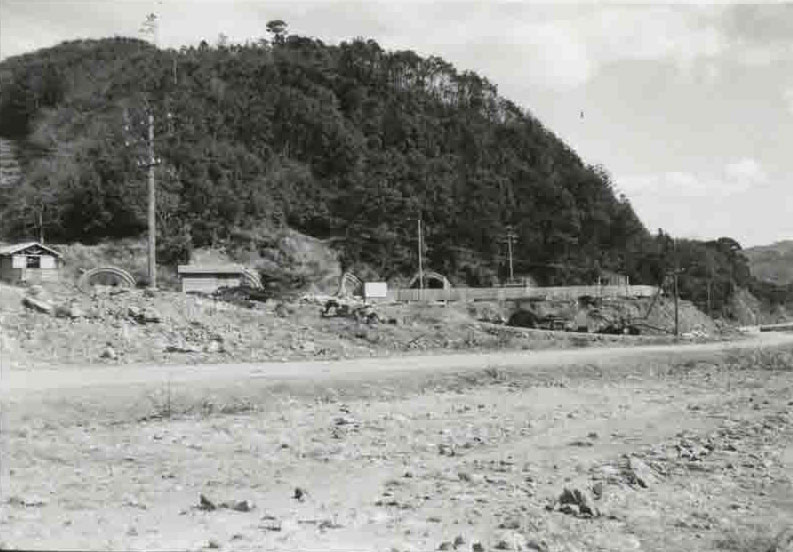 The Sumiyoshi Tunnel factory of Mitsubishi Nagasaki Arms Plant
The Sumiyoshi Tunnel factory of Mitsubishi Nagasaki Arms Plant
Property of Nagasaki Atomic Bomb Museum
What happened to my mother?
We crossed the railroad and entered into the forest. I had been thinking that there was no one left but here I found people. “No wonder I could not find humans in other places. They are all here”.
The injured were crowded between trees. Some were covered in blood and crying. Others seemed utterly wearied since their internal organs were out of their body. There were people shouting. Some were in anguish from burns. It was a sight which made you want to cover your eyes. I could not bear it any longer, so I went further inside.
I entered into the air raid shelter. Loneliness, quietness and cold air surrounded me. When I looked down and closed my eyes, my heart sank slowly and I saw my mother appearing. I thought, “What I am doing? I should go home right away.” I went out of the shelter and checked that there was no sound of bombing. I started to go down through the forest. It was around 3 o’clock in the afternoon.
A gas tank was dented like an empty can. There were many dead bodies and dead horses. I no longer felt anything. At all events, there were so many people lying on the ground. No one was moving. It was as if I was the only person walking. I felt like I would never see any human beings who were alive and well.
I met an elementary school boy in the river
The sound of my geta sandals echoed as I walked towards Moto Ohashi Bridge on the Urakami River and towards my house.
The bridge was torn down and had fallen into the river. I went down stone stairs and walked into the shallow place of the river. There again I saw many injured people. Their bodies were heated by the high temperature caused by the atomic explosion, and their throats suffered from severe thirst. People moved into the river begging “water, water”. However, those who drank water were led to death. I saw many dead bodies lying in the river.
When I took off my sandals to move across the river as quickly as possible, a boy who was around the age of a 5th or 6th grade elementary school student called me. “My legs are injured. Help me. I cannot walk. It hurts. Please help me. If I stay here any longer I will die”.
Unfortunately, there was no hospital nor doctor. Even if I wanted to help him, there was nothing I could do. From Urakami to Inasa, Nagasaki was completely destroyed. The horror of the atomic bomb is that you cannot help anyone even if you wanted.
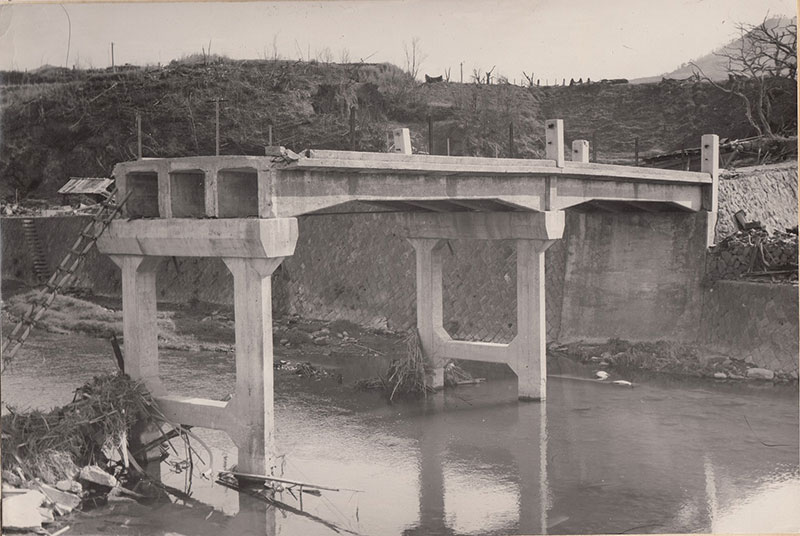 Moto-Ohashi Bridge
Moto-Ohashi Bridge
Property of Nagasaki Atomic Bomb Museum
A girl and her mother’s hair
I crossed the Urakami River and went up the road. I walked over fallen houses. A dead child’s body which had been thrown looked like a clay doll. A small girl who looked like a 1st or 2nd grade elementary school student was crying besides a fallen house. She was not injured. She said, “Help me. My mother is under the house”. I knelt down and saw hair under the house but how could I remove huge timbers of the house all by myself? I just left the scene. I was filled with sorrow since I could not help anyone. This was my experience of the atomic bombing. Soon, a fire broke out and the fallen house was burned down. I have no idea what happened to the mother and the child.
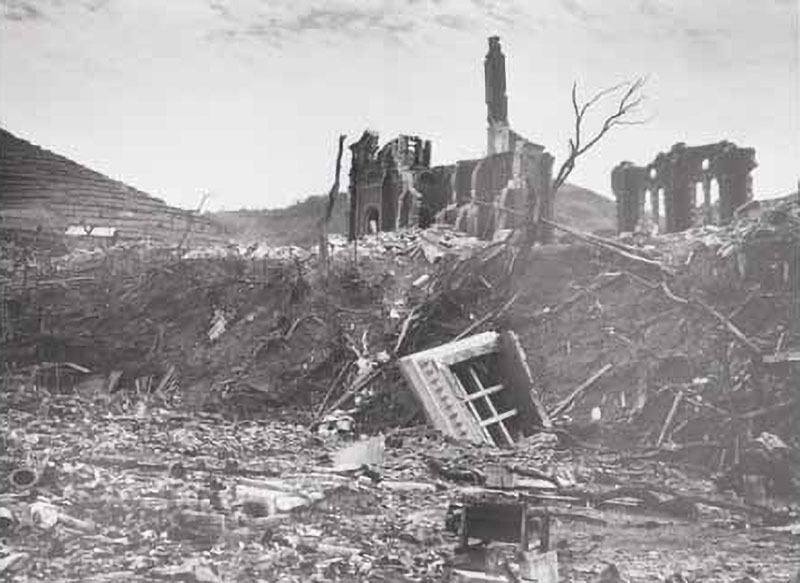 Urakami Cathedral
Urakami Cathedral
Property of Nagasaki Atomic Bomb Museum
My house was burnt. My mother was burnt too.
When I had a clear view, I stopped walking in utter shock. There was no house left. I went closer to my house. I had come from the tunnel factory which was located 2 or 3 kilometers away and was now only 500 meters from the hypocenter. My house was burned down. I could not find my mother’s body. As I looked on at the ashes of my house, it felt like all the spirit had left my body.
Where was mother? What was she doing? There were no tears. I could not cry. I could not enter the house since it was still burning and was on fire. All I could do was walk. I crossed the railroad at Ohashi and returned to Sumiyoshi Tunnel Factory. The tunnel was in confusion and I could not enter. I spent that night on the mountain.
The red sunset was disappearing into Mt. Inasa. What a day I went through. There was no power left to think for a 17-year-old boy. Nagasaki was in fire and smoke that night. The sky looked grotesque.
I seemed to be so exhausted, and fell into shallow sleep. I did not know whether it was a dream or an illusion but I saw my mother and shouted spontaneously. “Mom! Where are you?” She did not respond and disappeared, leaving behind her smile. I felt that she was no longer on this earth.
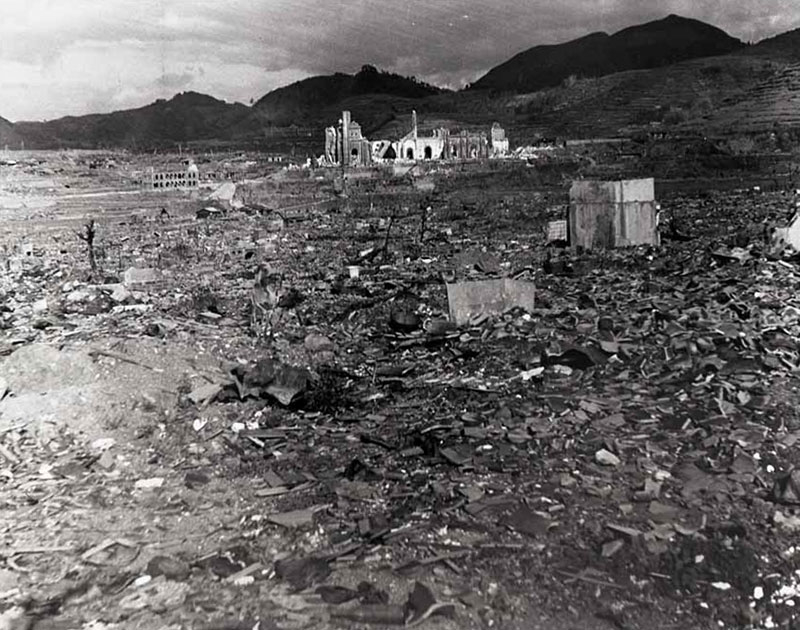 Looking towards Urakami Cathedral from the hillside of Yamazato-machi
Looking towards Urakami Cathedral from the hillside of Yamazato-machi
Property of Nagasaki Atomic Bomb Museum
What kind of bomb is the atomic bomb?
As a 17-year-old boy, I never knew that that bomb had been an atomic bomb. However I witnessed the power of the bomb with my own eyes. An atomic bomb causes blast winds, heat rays and most horribly, radiation.
Blast winds caused by the atomic bomb
For example, I witnessed the power of the blast winds when I saw a taxi blown about 20 meters from a road to a field. The car was upside down. The driver was naked and burnt and crouching in the field. It was about 1 hour after the explosion.
I also saw a man on a bicycle hit and thrown to the field. He was covered in mud and panting.
Heat rays caused by the atomic bomb
Peoples’ hair and skin were burnt and skin was sliding off from their bodies. Their shirts were torn off.
I used to walk in front of a luxurious house on the way to and from my work. The house was burnt and the owner of the house was sitting on the stone stairs of the entrance. He was naked and powerless and was suffering from burns all over his body. When I passed by again 4 or 5 days later, I saw him still sitting in the same position dead. His body was rotten since it was summer.
I saw a person on a bicycle carrying two burnt black bodies that were covered in mud. I also witnessed a burnt person who died in an upright standing position. I still remember the exact location. Because the energy of the atomic bomb was so great, human bodies became charcoal. His eyes were out of their sockets and his tongue was sticking out of his mouth. The person was burnt and black, but had died standing up. It was as if he was cursing the atomic bomb.
Recently, I saw a picture of a mother who had been burnt black in Hiroshima’s atomic bombing while holding a child. She was standing on one leg. When I saw it, I realized that what I saw on the day of the atomic bomb was real. Atomic bombs destroy everything. They destroy families, houses and people’s hearts. They are terrible bombs.
I used to attend mass at Urakami Cathedral every morning. The magnificent red-brick cathedral collapsed instantly. Since the cathedral also served as a food warehouse, it continued to burn for a few days.
The terror of the atomic bomb is radiation
After the bombing, a rumor spread that no trees nor grasses would grow for the next 70 years. Radiation could not been seen but continued to ruin humans and animals.
I helped my relatives from whom we were renting a house. 10 out of 11 members of the family were killed by the bomb. Only one survived. Those who died were not injured initially. However, they were all affected by radiation. Those who seemed to be unharmed gradually died, starting with a young child suffering from hair loss, skin rashes, diarrhea, fever, loss of appetite and fatigue. This is the terror of radiation.
Through the testimony of an elementary school boy from the same family, I found out that my mother was hit by the bomb when she returned to our house after spending time on the verandah of the relative’s house. Alone, I cremated 10 bodies of my relatives on a hill scorched by the atomic bomb. I cried while burying remains.
At an emergency treatment center built in Shin-Kouzen National School, I saw a man who killed himself because he was in so much pain.
To have a heart which understands the pain of others
After the war, I visited Auschwitz concentration camp in Poland in east Europe. Seeing stacks of women’s hair who were killed in the gas chamber, I remembered the hair of a girl I saw on the day of the atomic bomb. Why do humans do such a horrible acts?
War should never been fought again. We all know about the horrific effects of nuclear weapons, but humans are not yet engaging in nuclear abolition. There are many people who are still suffering from atomic-bomb-related diseases. It is time to think seriously about peace. “To have a heart which understands the pain of others” is the basis of peace. I sincerely hope that all of you will think about that.
Edited by the Nagasaki Foundation for the Promotion of Peace
Taken from Peace Talk; Volume 8
Under the Summer Sky
| Kazutoshi Nakamura (Age at the time of the atomic bombing: 17) |
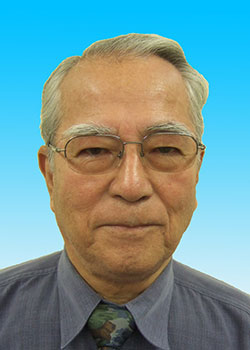 |
|---|
Before the Atomic Bombing
On the day of the bombing, the sky over Nagasaki was once again blue. The mid-summer sun had risen up from the mountains to the east, seeming to foretell the heat that was to come that day. The morning air-raid warning had been lifted and my brothers and I were focused on getting ready to go out and catch cicadas. Our home at the time was located at 273 North Yamazato-machi, the area just behind the Heiwa Kaikan (Peace Hall) building that now stands in Heiwa-machi. Just to the east were the grounds of Nagasaki Medical College and various facilities of Nagasaki University. The grounds were surrounded by chain link fences and looked enormous to a child’s eye. In the unbelievably lush camphor trees there were so many cicadas that you couldn’t see any spaces between them. They vibrated their bodies and chirped all day long. A mean-looking guard kept a watchful eye at the main gate, but a little way down the fence was torn and we could secretly go in and out to catch cicadas. We finally finished getting ready, but just then my mother told me that I had to help her. It was too bad, but I had to do what my mother said.
By that time, even a child could see that the war situation had taken an extreme turn for the worse and air-raid sirens sounded all through the day and night. Our evacuation site was a very basic air-raid shelter that had been dug at the far end of our small yard. At night, we would be woken up and have to go to that tiny shelter and sit shoulder to shoulder with all the other family members and hold our breaths. The huge bodies of the B-29 bombers would light up in the moonlight and glitter a silvery colour. Seeing that was enough to make even a child sense that things were going to end badly. The food situation had grown particularly desperate and rice with the husks of beans drained of their oil was being distributed in order to have enough for everyone. Dried bean husks are fragrant, but when boiled they give off such a foul smell that you can’t get them down your throat. I threw away wads of it, something my mother scolded me for. The trouble my mother took to keep her growing children from starving was no small thing. My kind mother was a devout Catholic believer who would walk down the street with a rosary clasped in her hands. She was a frail person of slight build who should have been resting from time to time, but instead she would always go out to barter for food for her many growing children, walking as far as it took.
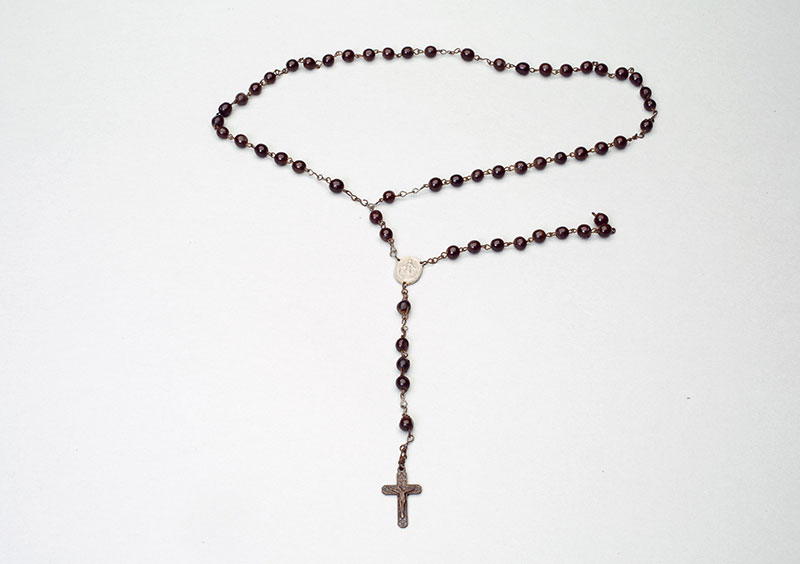 Rosary
Rosary
Property of Nagasaki Atomic Bomb Museum
On that day, she was going to the home of an acquaintance in the countryside to replace the emergency stores of rice she kept there with the newly-rationed rice she had received the day before. I was normally a lazy boy, but for some strange reason I was ready to do anything to help my mother that day. I carried the bulky and heavy rice on my back and followed after her on foot. We walked down the narrow alley in the direction of the main road, but after we had gone about thirty meters I nonchalantly turned around and saw that my two little brothers and my older sister’s two children were gazing steadily at us as they saw us off. As that was something out of the ordinary, I stopped where I was and looked back at them, unaware that we were actually saying our final farewells to each other.
Large messages were posted along the roadside we walked along. They said, “Destroy the Americans and the English!” “Luxury is the Enemy!” “Want for Nothing Until Victory is Achieved!” and “One Drop of Gasoline Equals One Drop of Blood!” There were many other messages, too. After some time, we reached the home we were looking for. It was on a low-lying hill in the Motohara district (now Tsuji-machi) called the Hill of the Cross which was covered with terraced fields from the midway point up. A family of four was inside the old farmhouse; an infant asleep in the backroom, a young woman who appeared to be the mother, a little boy, and a woman who was probably the grandmother. The adults all knew each other and were soon deep in conversation. The boy was about the same age as I was and we immediately hit it off. We became absorbed in playing games together, but when the sun was high in the sky my mother called out for me and started getting ready to leave, thinking about the children she had left at home. The boy and I were getting along so well however, that he begged me to stay and my mother gave me permission to play a little longer. My mother’s last words to me were, “I guess it’s OK, but make sure you don’t come home too late.” She took the stores of rice she had replaced and the potatoes she had been given for the children at home and then headed back down the narrow road. That image of my mother is still etched in my mind.
Darkness Comes
As noon approached, we two boys were told to go down to Shimono River and fetch some water. They had a well at the house, but it was the middle of summer and I guess they got extra water from mountain streams. We were given a steel bucket and then rushed off down to the stream. Unlike nowadays, the water in the rivers back then was clean and pure. We filled our bucket to the brim and started back up the hill, but the slope was steep and the water was heavy and we sweated profusely as we ascended the narrow path. When we finally made it to the house, the two of us climbed up the front step together and sat down in the entranceway. Right at that moment, there was a blinding flash of light and a resounding roar like that of a hundred thunderclaps. I completely blacked out.
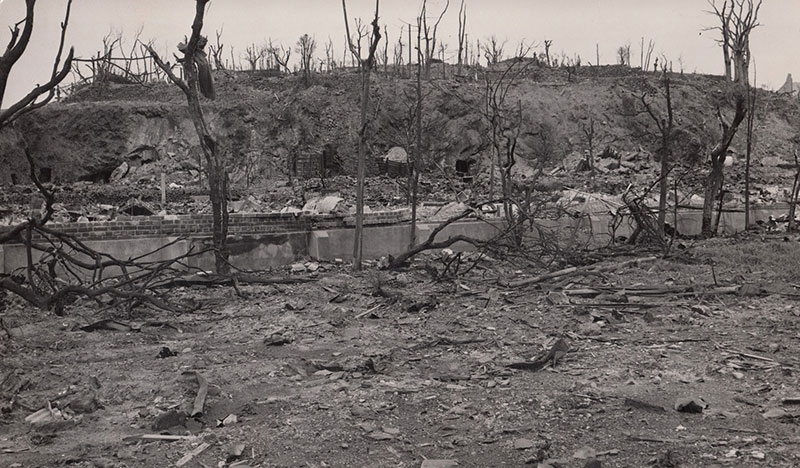 Looking north from the hypocenter
Looking north from the hypocenter
Property of Nagasaki Atomic Bomb Museum
I don’t know how much time went by, but at one point I grew desperate for breath and came back to my senses. I was in a complete state of confusion, however, and couldn’t think of anything at all. All I knew was that I was trapped under the wreckage of the house and lying with my stomach to the ground. I moved each part of my body and didn’t feel any particular pain, so I at least knew that I hadn’t suffered any injuries. Still, I gasped each time I tried to breathe through my mouth or nose and felt as if I was suffocating on dirt. Thinking I had to do something, I remembered the name of the boy I’d been with and called out, “Hey, Wakihama-kun!” From off in the distance he called back, “Hey!” He had been sitting next to me before, but (the blast) had thrown him to the back of the house. Fortunately, he was near an opening in the debris just large enough for him to get through. We decided that he would try to get out through it first and I would follow after. A beam that you could not even move with a lever lay right above my body however, and I couldn’t get to my feet. Using his voice to guide me, I crawled on my stomach and moved forward through the pervading soot until I came to the opening. I made it out and saw that the world outside had completely changed. The midsummer sun was nowhere to be seen and it looked as though the world was enveloped in dusk. There was no light at all in the darkness and I couldn’t hear any noise.
The two women had already gotten onto the roof of the house and were pulling out straw thatching while crying hysterically. Although it was dark, I could tell that they were trying to get out the infant that had been sleeping and went to help them. Just as they got the child out from the opening, flames came shooting up. The fire used to prepare lunch had spread to the straw of the roof. The flames chased us away and we ran around in the darkness bewilderedly, becoming separated amidst the combined sounds of the fires and people’s screams. I ran up into the terraced fields in the back, blindly fleeing to a place that the sparks could not reach. Gazing down on the city below, I saw a huge mass of fire that spread as far as the eye could see.
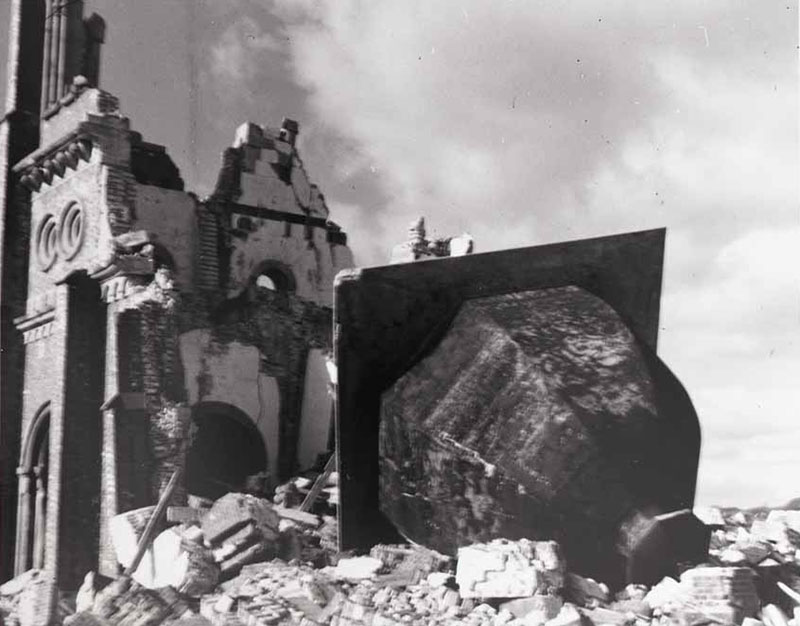 Urakami Cathedral
Urakami Cathedral
Property of Nagasaki Atomic Bomb Museum
What had happened to my mother? How far had she gotten on the way home? I screamed out “Mother!” Around that time I began hearing voices from down below and saw half-naked people who were covered in burns climbing up the hillside. Some of them had exhausted all their strength and fallen at the edges of the fields. I gazed on dumbfounded but then suddenly came back to my senses. I was a lone child, all alone in a place where I didn’t know anyone. I decided to start walking southward. My father worked at the shipyard and I felt sure that he would worry about the family and walk back in our direction, taking the route past the station and along the foot of the mountain. I was sure that I would meet up with him if I headed south. I made up my mind to do so and quickly descended the path that ran to the left of Urakami No. 1 Hospital (now St. Francis Hospital), taking a different route to the one that all the wounded people were going up. I walked along the river, cutting through fields and aiming in the direction of Urakami Cathedral. Along the way I kept coming across people who had been thrown great distances by the blast; some of them were moving slightly while others had stopped moving altogether. At first, I would jump back in shock each time I saw them, but by the time I came near Urakami Cathedral I had seen dozens of dead bodies floating in the river and no longer felt any shock or fear. The number of the deceased had been so overwhelming that my emotions had grown numb. I descended the hill behind Urakami Cathedral, which was now a huge mountain of debris, and headed to the river, crossing it at a point where the water was shallow and finally reaching the graveyard at Mt. Anakohboh. From there I gazed at the harbor and let out a huge gasp. The absolutely unbearable sight of a city that had been rendered a scorched wasteland stretched out directly below me. The gravestones had been knocked over and almost nothing was standing upright anymore. Further up the hillside a line of people had formed. Some were heading for Nagasaki Station while others were making their way toward the Urakami district to check on the safety of relatives. I decided to join that procession and had just started walking towards it when I heard a faint voice call out, “Big brother.” I was surprised because I hadn’t expected to hear any voices there and looked all around me. I saw a brightly-colored futon that had been thrown (by the blast winds) and spotted a boy’s face sticking out from the edge of it. His hair and face were burned and only his eyes remained bright. He spoke desperately to me, even though I had only passed by him by chance. “Big brother,” he said, “You’ll get me some water, won’t you?” He grabbed me with his burned right hand and gave me his crushed bento box. Perplexed, I told him, “We are high up on the mountain and there is no water here,” but he pointed down and said, “There is some over there.” He was right; looking in the direction I had just come from I could see the sparkling water of the river below Urakami Cathedral. That was a fair ways away however, and I told him that I had to hurry off to find my father, but added, “After I meet my father I’ll definitely come back and get you your water, so hang in there.” He gave a weak nod.
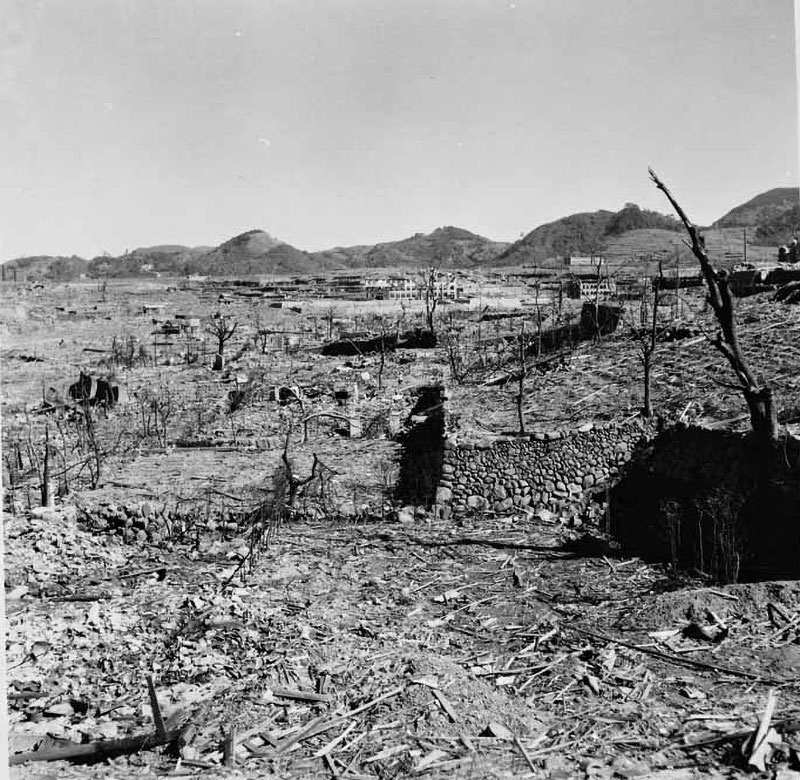 A panorama view of the hypocenter and Urakami No. 1 Hospital as seen from Yamazato Hill
A panorama view of the hypocenter and Urakami No. 1 Hospital as seen from Yamazato Hill
Property of Nagasaki Atomic Bomb Museum
I felt as if I was running away from him as I left the area and joined the line of people. The procession passed over the roofs of collapsed houses and cut across fields. When we reached the upper section of the Mezame-machi district, I clearly spotted my father at the back of an intersecting line of people. I ran over to him, pushing my way past the other people, and cried as I grabbed hold of his body. At last I was reunited with my father! My father was as surprised as I was and hugged me tightly, saying joyfully, “Oh, Kazutoshi! It’s so good you’re alive!” Then he asked, “How is Mom?” I guess she had told him that morning or the night before that she was going to go to the Motohara district. I told him what I knew, that she had left for home ahead of me. Knowing that there were some survivors in the area behind Urakami Cathedral, we immediately set off to look for her. When we got to the graveyard where I had been just a little while earlier, I told my father (about the boy I had met there) and we rushed over to where he had been. I immediately spotted the futon, but when we were just a few steps away from the boy a group of flies swarmed up from his body like black smoke. Sensing the worst, we went over by the boy’s head and saw that his arm was stretched out unmoving, exactly as it had been before. That boy would never look at me again. Seventy years have passed since then, but I still feel shame when I think back on that time
Nuclear Weapons
My father and I entered the scorched wasteland after the fires died down and spent the next few days covered in sweat and dirt. As the sun blazed down, hordes of flies swarmed around the bodies of my younger brothers and it was imperative that we cremate them as soon as possible. My brothers had died in the same place, looking just as they had when they were playing. As flies swarmed around us we gathered up pieces of unburnt wood. Although they were just children, we still needed a lot of wood to cremate four bodies to ashes. We placed the wood we gathered in a square and then my father and I held the partially burned arms and legs of my brothers to keep the bodies from sliding off. When we finally got them all on, tears suddenly came pouring from my eyes. Up until two or three days earlier we had all been playing together, or had that been nothing more than a dream? We waited for my brothers’ bodies to turn to ashes and then put them in a partly scorched bucket that my father carried as we set off to find my mother. Three days after (the bombing) there were still corpses that had not been claimed and I felt like fainting from the smell and the flies. We couldn’t leave my mother to a fate like that, however, and kept up our thorough and desperate search for her. Still, we were unable to find her and finally my father said, “Kazutoshi, let’s give up now. Your mother must have been blown far away; either that or she went directly to heaven.” He spoke as if he was talking to himself and brought our search to a close.
My father passed away early himself and I have long since eclipsed the age (when his life came to an end.) I sometimes visit the Memorial Vault for the Unclaimed Remains of the Atomic Bomb Victims in the Peace Park by myself and every August ninth my whole family goes there together. I hold onto the belief that someone found my mother’s remains and kindly took them to be interned with all the others.
Mother, please rest peacefully at this time, for I plan to join you in the not-to-distant future. If you can, however, please wait just a little longer. According to news reports, there are apparently around 16,000 nuclear weapons in the world. We must make sure that these are eliminated. Most of these bombs are said to be tens or hundreds of times more powerful than the bomb that took your life and the lives of so many others, and they can be delivered in numerous ways; from the sky, from the sea or across the land from sites thousands of kilometers away. I suppose that the abolishment of these weapons will be strongly resisted by the nuclear-armed nations. I believe, however, that if we work doggedly to build up public opinion, continuously raising our voices and never backing down, then the day of abolishment will come even for nuclear-armed nations. Mother, I hope that you and all the others will lend us your strength. I also ask the students visiting Nagasaki to add their strength as well.
“Abolishing nuclear weapons is the foundation for peace,” I tell them. “Please make every effort to become adults who will raise your voices for the elimination of nuclear weapons!”
Edited by the Nagasaki Foundation for the Promotion of Peace
Taken from Peace Talk; Volume 10
A Midsummer Nightmare:
The Wooden Cross
| Hirayama Kanenori (Age at the time of the atomic bombing: 17) |
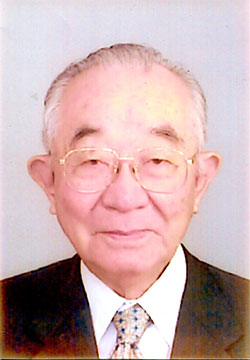 |
|---|
Mr. Hirayama experienced the atomic bombing while in Takenokuboh-machi, a neighborhood 1.5 kilometers southwest of the hypocenter. He was 18 years old at the time.
400 Meters from the Hypocenter
My home was located at 2-3 Motoh-machi (down the hill from Urakami Cathedral), just 400 meters from the atomic bombing hypocenter. Right behind us was the home of Mr. Kawaguchi (a man known as an oshie-kata¹) and nearby was the family home of Masami Fukahori, the head priest of Yahata-machi Church, which was also a lantern shop where kites, tobacco, stamps, dried foods and other things were sold. Diagonally across from us was Tagawa General Store (which is still in business today) where I would take the one yen allowance I was given for attending lessons and buy sweet potato snacks, salted beans and dried seaweed on my way home from keiko². That was one of my childhood pleasures in the prewar days. At Shimosaki Store, crosses, rosario³, candle holders and pictures of saints were sold. Across the way was Urashima Cask Makers, where I can still remember seeing people hard at work making caskets on the days before funerals. In the tranquil fields surrounding the area, we flew kites and lost ourselves in kite fighting battles. The remarkable brass band of Urakami Cathedral was renowned in prewar days and would perform not only on celebratory days but also at funerals, where they would play Beethoven’s Funeral March during the Solemn Mass. Another thing I remember is the pomp-filled inter-district baseball games that were organized by the Church Men’s Association and held at the athletic ground of Nagasaki University.
Such a peaceful environment was then visited by what the Pope called “the evil that is war” and on August 9 the hideous atomic bomb was dropped here.
Notes on Japanese terms used by the Catholic community in prewar days:
1. oshie-kata (“one who teaches”); a person who teaches Catholic faith and catechism
2. keiko (“practice”); Catholic study groups, or church school
3. rosario (“rosary”); prayer beads which are like Buddhist prayer bracelets
Before and After August 1
Air-raid alerts were issued almost constantly in June and July, and whenever the sirens sounded we would think “Not again!” and get inside closets. That was nothing more than pretense however, as our house was made of wood and we knew that our lives would end if any bombs ever came falling down. Still, it seemed too burdensome to go to the far-off air-raid shelter and so my mother and I would just hide ourselves in the closet.
Following the sounding of one air-raid alert, some American B29 bombers came flying into the airspace over Nagasaki, their silver duralumin bodies and wings sparkling brightly. They continued over Mt. Iwaya and Omura Bay and headed in the direction of Kawatana. Shortly afterwards, we heard the BLAM, BLAM, BLAM of bombs exploding.
People trembled in fear amidst those disturbing sounds and secretly whispered things to each other.
“They won’t drop bombs on Urakami because there are so many Christians here.”
“No, Urakami Cathedral makes too good a target; we’ll be hit for sure.”
In private, people continued to express their wishful thoughts that Nagasaki alone would be spared. The air-raid of August 1 showed that that was not the case, however. (During the attack) the thud of exploding bombs repeatedly echoed in the pit of my stomach and I frantically buried my head under my futon because I thought I was going to be hit at any moment. There had been air raids before, but on that occasion I truly felt terror for the first time and desperately prayed to Mother Mary.
The bombing went on for an extended period of time and towards the end the engine roar of low-flying planes sounded. Amidst the BANG, BANG of machine-gun fire I heard the WHOOSH of shells zipping by. I held my breath as I never had before, knowing that the shots were extremely close. I later heard that two bombs landed near the smoke stacks of the university hospital at Shukunosaka (now the neighborhood of Hirano-machi), which as chance would have it is just in front of where I live now, while others fell on the Iwakawa neighborhood.
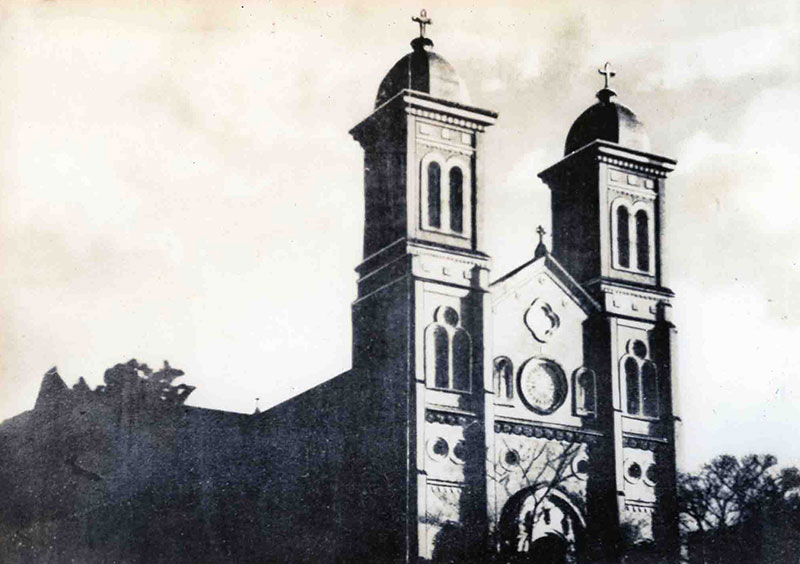 Urakami Cathedral
Urakami Cathedral
Property of Nagasaki Atomic Bomb Museum
The Nightmare of August 9
When I set off for work at around 7 a.m. on the morning of August ninth, it was the one time I left without saying good-bye to my mother. Just before seven-thirty I arrived at my workplace, the Inasa sawmill of Mitsubishi Shipbuilding (the place where the platform of Mt. Inasa Ropeway is today.) The relentless issuing of air-raid alarms had become a daily occurrence and we were digging air-raid shelters every day. I immediately went to the site below Fuchi Shrine and started working there. (The site was located 1.5 km southwest of the atomic bombing hypocenter.) Soon enough, an air-raid alarm was issued and we evacuated to a cliff-side shelter midway up Mt. Inasa. Arriving to find that the shelter was already filled with elderly people, women and children, we stood outside the entrance. It didn’t seem as if any enemy planes were coming.
When the air-raid alarm was lifted a little while later and replaced with a warning, we went back down the mountain and got to work digging an open-pit shelter. As the summer sun shone down and the cicadas chirped energetically, I fought back my hunger and went about my work. Then I heard the faint sound of airplane engines and a middle-aged man who was working with me stopped his digging and got up out of the shelter. The engine roar of what I thought might be enemy planes grew louder and louder, but the hole we had dug was already deep enough for us to stand upright in and the surrounding area was hidden by giant trees, so I didn’t worry too much and continued digging. Then I heard the voice of the man who had come up moments before.
“Those are probably enemy planes. Something that looks like a white parachute is falling down; it might be a new-type bomb.”
As soon as he said that, a flash of light as bright as a huge flare of magnesium lit up the area. In the next instant everything grew dark from all the dirt and dust and so much sand came shooting against my body that I thought I might get buried alive. My glasses were blown off and I was thrown into the hole. My entire body was covered in sand. The inside of my mouth was gritty and I gasped for breath as if my throat was full of sand. I gave up hope and thought, “Ah, I’m going to die now.”
Some moments later, it once again grew light in front of my eyes. Feeling as if I had been saved, I got up and saw that all the huge, lush trees had been blown over and were lying on their sides, as were the stone pagodas in the graveyards. It was a wretched sight. I frantically crawled up out of the hole and fled to the hillside air-raid shelter. I was so intent on escaping the terror that I acted completely on instinct and hardly noticed anything along the way, except that there were people lying on the ground.
Just then I realized that I needed my glasses or I wouldn’t be able to see anything and turned to go back to the open-pit shelter. As I did so, I saw that the area beyond the Urakami River was a sea of fire and clouds of black smoke were billowing up in the sky. In Takenokuboh, the area in front of the river, all the houses had been flattened. From somewhere close by a tortured voice cried out, “Help me, please!” but there was no way I could help anyone without my glasses. I carefully groped about the hole I had been in and finally managed to find my glasses. Luckily, they were unbroken.
When I got down to the road that ran alongside the river I could not believe what I saw. There were people whose faces, heads and upper bodies were burned; people whose faces were so deformed that you could not recognize them; and people who were limping along as blood dripped from their wounded legs. Seeing flocks of those people trudge along the Urakami River was like watching hell on earth.
I was concerned about the safety of my family, but the sound of the voices calling “Help me!” filled my ears and I couldn’t get myself to leave. Five or six of us who were in the same area then tried to lift away the roof tiles and wood of the collapsed houses, but it was hard for novices like us to do much. The work went slow and we didn’t make much progress. Still, we managed to free four or five people before evening, at which point I once again grew worried about my own family. Then the flames reached the saw mill and a mountain of piled-up wood went up in a ferocious blaze. I left for home.
The noise of all the burning houses was incredible and dark red flames were shooting up to the heavens. I couldn’t tell where the roads were and the Urakami River was my only direction marker. I got into the river and followed it upstream, crossing over at one point to Shimono River and crawling ashore. Many people with stunned and blank expressions were trudging along the railroad tracks in the direction of Michinoh.
At Matsuyama streetcar stop, I veered off from the train tracks and headed in the direction of Urakami Cathedral. The area in front of me was a sea of flames, however, and there didn’t seem to be any way to get through. I stopped where I was, at which point a man who looked like he was from the civilian guard said, “You’ll die if you try to go that way.” Giving up, I went back to the train tracks and followed them across the steel bridge at Ohashi. Night had fallen by then and my feet were shrouded in darkness. The flames of the still-burning houses shot up here and there.
While I was crossing the steel bridge, one of the people walking alongside me began to talk. He told me that he was Mr. Kataoka, a teacher of Chinzei Junior High School. Apparently he had been in the shadow of the reinforced-concrete school building and that was why he had survived. He said, “Let’s spend the night here because it’s too dark now and dangerous for us to proceed.” We went to the foot of an escarpment in a field in the Nishi-machi area and set ourselves down. Mr. Kataoka said, “I didn’t eat lunch, so let’s cook some rice” and, after taking a rice cooker pot out of his backpack, set about washing some rice with water from a nearby well. When he finished, he took the pot over to some burning wood and started cooking the rice over it. I partook in the feast, but my mouth was dry from all the sand and dust and when I took a mouthful of rice the sand made a gritty sound. It was literally like eating cardboard and I hardly got anything down.
I lied down after the meal, but my mind was racing from the succession of shocks I had gone through that day and I found it hard to sleep. I managed to doze off for a while because I was so tired from all that had happened in the afternoon, but in the middle of the night I was awakened by the sound of explosions. Flashes of light that looked like flare bombs were lighting up the sky above Mitsubishi Arms Factory (now the site of Nagasaki University.) I thought, “Oh no! Is this another new-type bomb?” and instinctively hit the ground. Two or three times the sky lit up as if it was noontime. I thought I was going to die then and there.
Everything stopped after that however. Nothing more happened and I once again fell asleep.
The night sky grew light as I dozed and in time we could make out our surroundings. I looked around and saw that the houses in the area were still smoldering. Taking a closer look, I saw that a number of scorched-black skeletons were piled up at the burned-down house in front of us. Looking off to the side, I spotted a body floating in the well that Mr. Kataoka had gotten water for cooking rice from the day before.
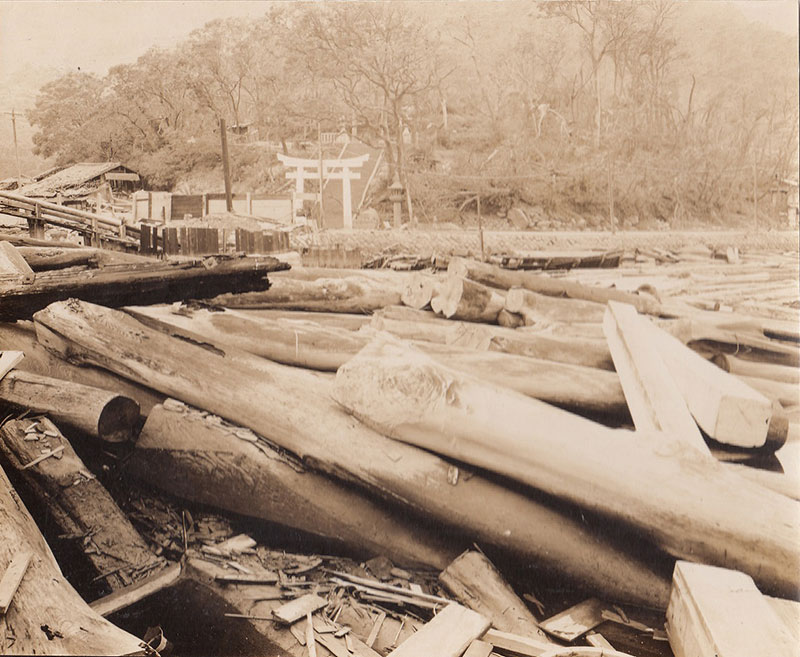 Fuchi Shrine and the lumberyard of Mitsubishi Shipbuilding Inasa Sawmill
Fuchi Shrine and the lumberyard of Mitsubishi Shipbuilding Inasa Sawmill
Property of Nagasaki Atomic Bomb Museum
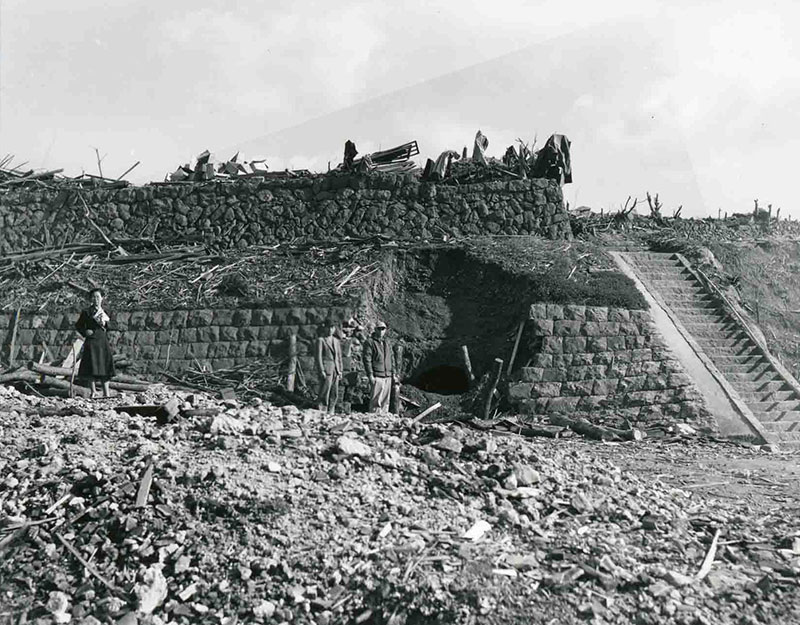 Air-raid shelter
Air-raid shelter
Property of Nagasaki Atomic Bomb Museum
August 10: The Hot Debris
In the distance, large buildings such as Mitsubishi Arms Factory, Yamazato Elementary School and, a little further to the right, Shiroyama Elementary School, were still burning and the flames had yet to die down. The wooden houses had all burned to the ground and, with the exception of the burning buildings that were still standing, the entire area was a scorched wasteland. There was nothing at all to focus your eyes on. As I gazed at the scorched earth and thought about how my mother and brother might be dead, I cried for the first time. Once my tears had begun to fall they came pouring out and wouldn’t stop. That was the point when my sense of humanity first came back to me.
I parted ways with Mr. Kataoka and headed for my home. The debris at my feet was still hot. Stepping along the hot ground, I made way to the area around Urakami Cathedral. The cathedral where we offered our prayers every Sunday had been pulverized and was in a horrific state, with only a few sections of the brick walls remaining standing. When I saw that, I felt all the strength in my entire body drain away. I knew I could not get discouraged, however, and urged myself on. I kept saying, “I have to fight on. I have to fight on” and continued toward my home.
I came to what I thought was the right area, but I couldn’t see where my house had been. Nor was there any trace of the house of my mother’s aunt, who lived next door to us. I felt bewildered and vacantly sat down in the burned ruins for a while. Then I started walking again, setting off for the home of my uncle who lived in Jounodaira, the neighborhood behind Urakami Cathedral. While I was walking next to the cathedral grounds I saw that the brick building that had been praised as the grandest (church) in the Orient was now nothing more than a pile of bricks. I also saw that the bags of rice in what had probably been a storeroom for emergency rice were exposed and burning along with the lumber. I didn’t think about what a waste it was and simply passed by in a daze.
Along the way I came across someone I knew. We were happy to see each other and told ourselves to stay well and keep fighting. While we were asking each other questions he told me that he had seen my brother near the Takao-machi neighborhood. I now had a glimmer of hope and wanted to see my family as soon as possible. I picked up my step and made it to my uncle’s house.
All along the way, I had been thinking, “My uncle’s house will be OK. There can’t be much damage,” but I found that it too had been completely destroyed and burned to the ground. There was only one person there. It was cousin of mine who was groaning in agony in the field beside the house. There was nothing I could do for him, however. I just tried to console him by saying, “If you keep fighting, you’ll be saved. Hang on a little longer.”
I asked him a number of things and found out that he had been inside his home until just before the bombing. Then he heard a strange explosion sound and ran as fast as he could out of the house and all the way to the athletic ground of Nagasaki Medical College. Next came the blast. He said he didn’t remember anything after that. His legs were a bluish-black color up to the thighs and as I watched the color spread to his upper body as well.
He kept saying over and over, “I don’t want to die like this. Please help me.”
There was nothing I could do except say, “Keep fighting and pray to God.”
Thinking that there was no chance for him, I decided to get him a final drink and went to fetch some water. I rushed back, but by the time I got there he had already passed away. In the end, the bluish-black color spread like a toxin all the way up to his chest. I was filled with regret that I hadn’t been able to get there earlier and give him his last drink.
I grew worried about my older brother and felt I should hurry off to look for him, but I also couldn’t ignore all the suffering people I saw around me. I fetched water for the people who were gasping and couldn’t move and placed it at their lips so they could drink.
I descended to the banks of Tagawa River, where more people had gone in search of water. Among them were those who had already passed away. There were also people who had gotten within reach of the river but then stopped moving and could only plead with leaden eyes, “Water! Water! Give me water!” There was a girl whose clothing had been burned off and whose body was covered with burns. It seemed to take all her energy just to mutter, “Wa-ter… Wat-er…” I collected some nearby spring water in my hands and gave it to her to drink. She must have been unaware that she was completely naked because she didn’t seem to be embarrassed at all. I was suddenly overcome with a feeling of horror. The sight was so cruel that I became overcome with a desire to avenge all the suffering.
I left that area and searched all around until I finally came across my brother. The right side of his skull had been cracked open and part of his brain was exposed. In addition, the left side of his face was so badly burned that you couldn’t distinguish his features. It was only by looking at his right side that I finally recognized him. His mental condition was waning and he spoke deliriously, saying things like, “I’ll be OK because the rescue squad will be coming soon,” and “Japan will win out in the end.” He cried out, “Water! Give me water!” over and over, but by then I had seen so many people die after taking drinks of water that I told him, “You have to hold off because you’ll die if you take a drink.” While I was saying that his wife came along.
“They’ve set up a temporary first-aid station just below the Franciscan hospital,” she said, and the two of us quickly carried my brother there. He kept growing weaker, and seeing him use every last ounce of strength he had to call out, “Water… Water,” was more than I could take. After we had them put iodine on his wounds, I placed some water at his mouth. He took a single sip and, seemingly gaining peace of mind, took his last breath as his wife held him in her arms.
I had absolutely no clue as to my mother’s whereabouts. A wave of anxiety came over me as I worried about what I would do from then on if I was left all alone. I went to look at my brother’s wife’s family home beside the university hospital in Sakamoto-machi, but that house had been blown away as well, and not a trace of it remained. The little stream nearby was filled with wood and other debris from the destroyed houses. Scorched trees stretched up forlornly, looking like the last trees standing at the end of the world. Dusk came and stars began twinkling again in the night sky, beneath which the moaning cries of people could be heard all around.
As I listened to the voice of someone praying, “Our Father, who art in heaven…” I lay on the ground under the open sky and slept the sleep of the dead.
Later I found out that the person who had been praying was the father of my brother’s wife.
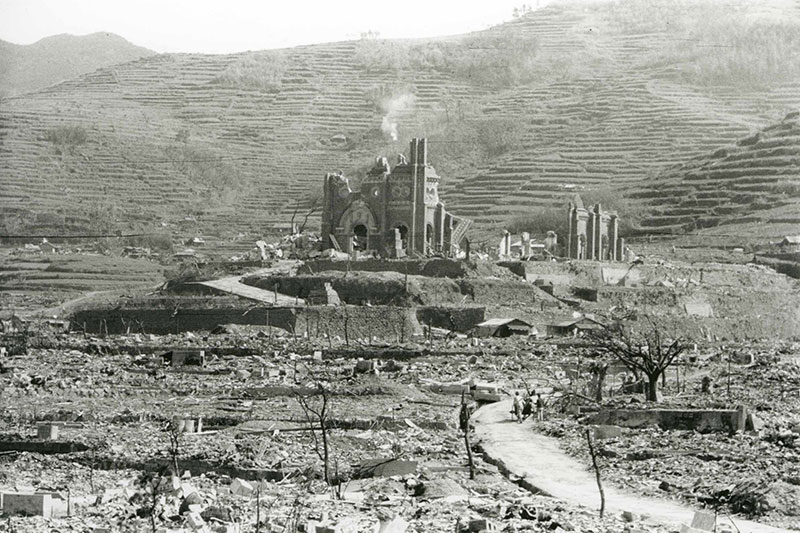 Looking towards Urakami Cathedral from the hillside of Matsuyama-machi
Looking towards Urakami Cathedral from the hillside of Matsuyama-machi
Property of Nagasaki Atomic Bomb Museum
August 11: Cremating Corpses
Thinking that my uncle might come back that day, I went to the place behind Urakami Cathedral where his house had been. He had fortunately made it back unwounded, but he was sitting there in daze after finding that everyone in the family had died. In the scorched wasteland, large buildings continued to smolder. There was no way to put out the fires at Urakami Cathedral, Yamazato Elementary School, the university hospital, Mitsubishi Arms Plant, Mitsubishi Steelworks and other buildings, so they were left to burn to the ground.
My uncle got up and we started talking.
“What should we do now?”
“We should go to the home of our relatives, the Fukahoris.”
“OK. Let’s go.”
We set off, but of course the next area we went to was completely destroyed as well. Inside an air-raid shelter, Aunt Fukahori was barely conscious and on the verge of taking her last breath. The survivors were collecting wood and using it to cremate the bodies of those killed by the explosion. I joined them, but it seemed to me that we were only burning inanimate objects and I didn’t feel any sympathy or think about how awful the situation was. I was in a strange mental state and had completely lost any semblance of my humanity. When I picked up the bodies and grasped the cold, sticky hands, however, I did feel an indescribable feeling that chilled my heart.
The home had been surrounded by farms and rice fields, so debris was scattered across the land and remained unburned. We went around collecting things and carried them back to the entrance of the air-raid shelter. The shelter was filled with badly wounded people, so those of us who were still in good condition laid tatami mats outside and rested there.
The Fukahoris were butchers, so they slaughtered their dying cattle and divided the meat up among the people in the area. We picked potatoes and pumpkins from the fields and stewed them with the beef to eat. Not having eaten for days, I found the taste delicious and felt as if I had been brought back to life.
The shelter was filled with wounded people that night, so those of us who were still healthy set up mosquito netting and slept under the open sky. It was two days after the atomic bombing. Many stars sparkled in the sky, but I was in no state of mind to look up and appreciate their beauty.
August 12: The Death of a Six-Year-Old Child
Upon hearing news that the six-year-old son of the Fukahoris had been taken to Yamazato Elementary School, we went over and found him completely covered in blood. It gave me an unsettling feeling to see him looking so thoroughly emaciated, perhaps from not having eaten, with only his eyes retaining some glitter of life. What a horrible thing it was to have such a simple and innocent child become the victim of war among adults. My temper rose and rose until I was furious. Up until then, I had not felt even the slightest bit of human emotion, no matter what horrible sights I had seen. My heart had not been moved in the slightest and my nerves had grown completely numb. It was almost as if I had been watching things happen in a dream.
I have since come back to my proper frame of mind. In my opinion, no one would use atomic bombs if they knew the true extent of the damages they caused. The idea of using atomic bombs to bring about justice is absolutely illogical. Therefore, I believe it is necessary for all Japanese people to learn about (the atomic bombings of) Hiroshima and Nagasaki and to tell people around the world about them.
The Wooden Cross
When the atomic bomb was dropped, our wooden house was blown off its foundation, my mother disappeared, and of course all our household belongings and furniture burned to ashes. While looking for my mother’s belongings in the exposed ground where our house had been, I discovered in the shade of the foundation stones the wooden cross that my mother always kept at the family alter and held when reciting rosaries. Oddly, it had avoided the heat waves and was still in its original state. It is now enshrined at the family alter of my own house and serves as a kind of manifestation of my mother.
Pope John Paul II sent out a message from the atomic-bombed nation of Japan for those who have suffered from the atomic bombing for fifty-eight years and for the children and grandchildren who will live on in the future. He said, War is the work of man. War is the destruction of human life.” I intend to take care of this wooden cross that survived the atomic bombing as I know it will look over us in the future. The cross is the manifestation of my mother, my older brother and the many other victims of the atomic bombing, and by saying prayers to it I have come to experience the preciousness of peace. In order to fulfill my obligations as one of the survivors of the bombing, I now strive to live my daily life as a form of prayer.
I would like to express my sincere gratitude for having this poorly-written atomic bombing testimonial published in Lion Magazine and would be most pleased if it has served to convey the horrors of the bombing.
Written by Kanenori Hirayama
Taken from A Midsummer Nightmare: The Wooden Cross
Rushing to my Home behind the Cathedral
| Shigemi Fukahori (Age at the time of the atomic bombing: 17) |
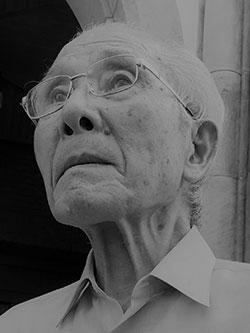 |
|---|
Going from Oura to Urakami to check on my family
I was attending Nagasaki Theological Seminary at Oura Cathedral in order to become a priest. I lived in the seminary and commuted to Touryo Junior High school. There were about 10 seminarians from Urakami are who were studying in the seminary to become priests.
After the atomic bombing, in the afternoon of the tenth, I went from Oura to Urakami in order to check on the safety of my family. From Nagasaki Station on, all that remained were the platforms of the streetcars. There were also skeletal remains. The atomic bombing had turned everything to a scorched wasteland. As for roads, there were now only openings in the debris that we could just barely pass through. That was how I made my way along. The name of the river was Shimono-kawa. When I walked along the deep pool of the river it was full of people who were now pitch-black. I guess they heard me approaching because I heard voices calling “water, water”. I remembered when I got burned as a child and was told not to have water. Besides, I could not see any water in the river since it was filled with people. I did not know whether they were dead or not.
I didn’t know that area was the hypocenter. I passed by the outskirts and when I got a view of Urakami Cathedral I saw that the towers were missing and thought, “Ah, then my house must be gone too.” I had not been worried because my home was right behind the church and would have been sheltered from an ordinary bomb, but when I saw that the towers were missing I felt that my family could not have survived. And so it was, except for my older brother who was off in the army. The lives of my six other older brothers, my two older sisters and my little sister and brother were all lost. I had already lost my mother when I was a child. My father was working in an air-raid shelter in Mitsubishi arms factory in Akasako. He was at home that day.
During the war, big buildings were used to store rice or canned food for emergencies. Rice and canned food were stored in Urakami Cathedral too. My father told me later that the next day he heard the sound of cans exploding starting around 5 a.m. He told me that the sound was as if a bomb had hit the place. When I met my father at the ruins of our home, no words came to my mouth. I did not shed any tears. We went to an air-raid shelter where we found more than 10 people living. They gave me boiled water but when I went back to seminary in the same day, I had diarrhea. I could not eat anything for 3 days. Fellow seminarians who were a grade higher than me were working in a factory in Hamaguchi-machi. They came back over the mountain in the night. They were suffering from burns and died the next day.
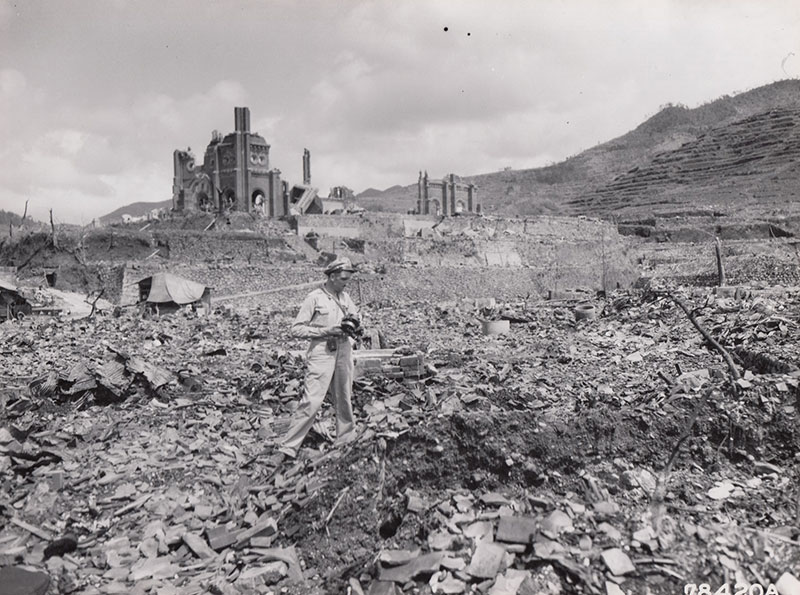 The area around Urakami Cathedral
The area around Urakami Cathedral
Property of Nagasaki Atomic Bomb Museum
Edited by the Society for Preserving the Postwar History of the Nagasaki Atomic Bombing
Taken from 70 Years After the Atomic Bombing
